What Are Specialty Search Engines and How Should You Use Them for SEO?
Specialty search engines are software programs that provide users with search results within a defined niche. This can involve returning results about a specific subject matter, for a specified geographical region, from specific data sources, or while using a particular functionality, such as increased user privacy or eco-friendly practices.
While Google easily dominates market share for search engines, certain organizations may still see benefits from appearing in the right specialty search engine. Not only do you need to understand what specialty search engines are, but also how they function and what audiences use them.
Keep reading to learn whether your organization should use specialty search engines for SEO, what some of the most notable specialty search engines have to offer, and how to get started today.
Should I Pay Attention to Specialty Search Engines for My Business?
First and foremost, you’ll need to determine whether it’s worth your time to concern yourself with specialty search engines. At present, Google has a market share of 92.07% worldwide. In the United States, Google’s market share is currently 87.43%.
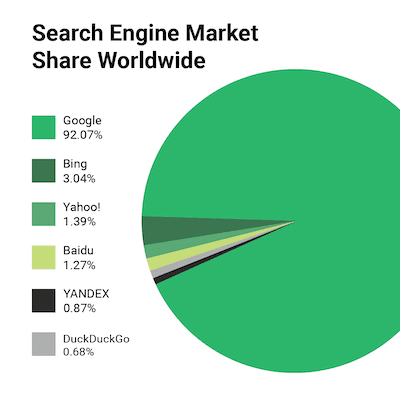
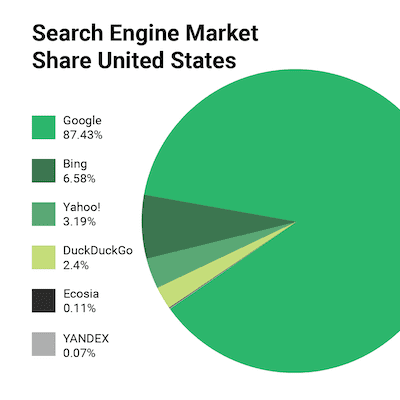
By and large, users will find your organization through Google. If you want to improve your chances of being found, you have to optimize your website and its pages for Google. But that doesn’t mean you can’t take any other search engines into account.
There are 2 main scenarios when it may be useful to optimize for a specialty search engine:
- A relevant audience is already finding you on a specialty search engine
- Your target audience is likely to use a specialty search engine
How Do I Know if I’m Getting Traffic from a Specialty Search Engine?
The easiest way to tell if you’re receiving traffic to your website from a specialty search engine is to check with Google Analytics.
Go to the Acquisition Reporting section and check the Source/Medium report under All Traffic. Search for “organic” in the search bar to limit the results to search engines. This will allow you to see how many website visits you’ve received from different search engines.
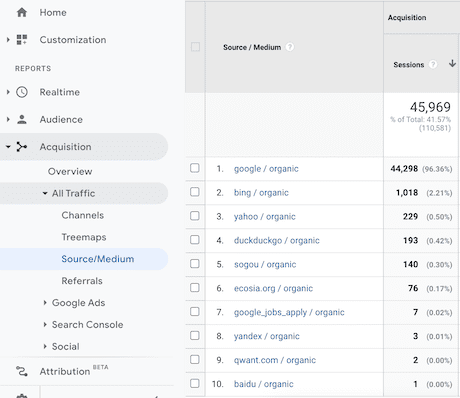
Depending on your definition of a search engine, there may be some relevant websites that are not considered search engines by Google Analytics that you’ll want to check. For example, Craigslist can be thought of as a job search engine, but it will show up as a referral medium rather than an organic medium in Analytics. Search for “referral” in the search bar to see these results.
What Are Specialty Search Engines Used For?
Even if you aren’t receiving any traffic from a specialty search engine yet, that doesn’t mean your audience isn’t there. Consider what specialty search engines are used for and if this matches your audience.
Think about your target audience’s geographical region, values, and industry to help determine if they may be using a specialty search engine. You may also be able to gain an understanding of your audience’s search habits through surveys, anecdotal information, and research.
Search Engines by Geographical Region
If you serve customers outside of the United States, it is worth considering what search engines are most popular in those countries.
- China is one of the few nations where Google is not in the top 3 search engines. Baidu holds 79.49% market share, Bing 8.77%, Sogou 4.22%, and Google just 3.02%.
- South Korea favors Google at 75.21% market share, but also sees a sizable portion of searches (18.91%) go to Naver.
- Japan also uses Google most at 75.97% but sees a sizable portion of searches (16.2%) go to Yahoo!
- Similarly, Taiwan searches most with Google at 94.98% followed by Yahoo! at 3.56%.
- In Canada and the United Kingdom, the top 3 search engines are the same as in the U.S.: Google, followed by Bing, followed by Yahoo!, but Google actually holds even more market share in Canada (at 91.42%) and the U.K. (at 92.8%) than in the U.S. (at 87.43%).
Specialty Search Engines for Privacy and Environmental Purposes
If your target customers place a high value on their privacy, then they may not want to use Google, which tracks user behavior. Search engines like Google also personalize their search results, which can lead to a “filter bubble” in which users are more likely to see search results that align with their own views.
DuckDuckGo is the most successful specialty search engine focused on user privacy. In the U.S., it is the fourth most used search engine with 2.4% market share.
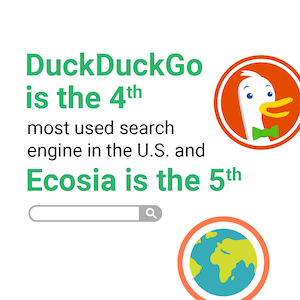
For customers who value sustainability, Ecosia has emerged as the forerunner in eco-friendly specialty search engines. It is the fifth most used search engine in the U.S. with 0.11% market share.
As part of its commitment to the environment, Ecosia donates 80% of its ad revenue to planting trees, powers 100% of its searches with renewable energy, and is a certified B Corporation with an impact score of 106.8, well above the minimum requirement for certification of 80 and the median business score of 50.9.
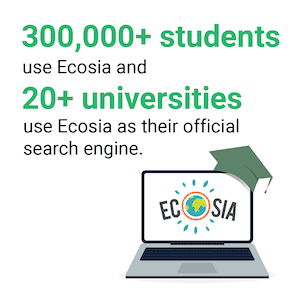
There is also a movement among college and university students who aim to make Ecosia the default search engine on campus. In 2018, Ecosia reported that 20 universities and more than 300,000 students used their platform. Ohio State University, Toulouse Business School, the University of Glasgow, the University of Leeds, and the University of Sussex are among those who have made Ecosia their official search engine, according to Ecosia and Forbes.
Subject Matter Specialty Search Engines
Perhaps the biggest category of specialty search engines belongs to those that specialize in a specific subject matter. Several industries lend themselves more to specialty search engines than others, including food, real estate, and hiring for jobs or internships.
Food
Real Estate
Job Search
- CareerBuilder (USA)
- Chegg (USA)
- Dice (USA)
- Glassdoor (USA)
- Indeed (USA)
- Craigslist (by city)
- Monster (USA), (India)
- Naukri.com (India)
- JobStreet (Southeast Asia, Japan, India)
- Rozee.pk (Pakistan)
- Adzuna (UK)
There are also several search engines devoted to user-generated questions and answers, which give businesses the opportunity to share their knowledge with a highly targeted audience. The most notable of these are Quora and wikiHow.
Want to Improve Your SEO? Contact Our Experts
Online Optimism is a digital marketing and design agency serving clients across the country. If you want to get your business ranking for more search terms and increase your organic traffic, contact us about our SEO services today.
